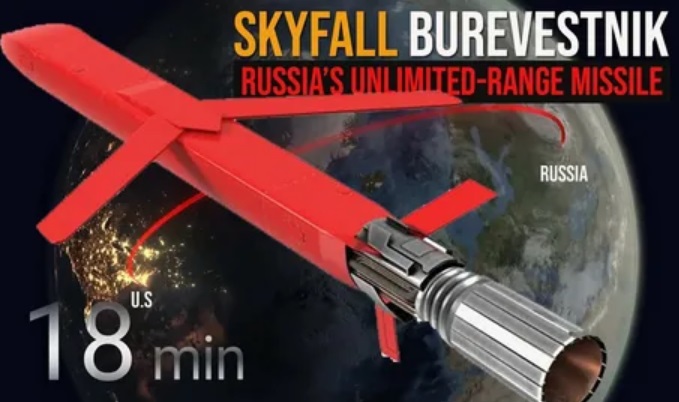 Pic.: You Tube
Pic.: You Tube
Russia's Burevestnik nuclear-powered cruise missile has drawn renewed attention after multiple media reports speculated that Russia might recently conduct new tests, Chinese ‘The Global Times’ writes.
US media outlet Newsweek reported that a US Air Force WC-135R aircraft designed to track nuclear testing in the atmosphere flew close to Russia's nuclear bases in the northwest of the country last week.
Analysts tracking the flight online said it could indicate that Russia may soon carry out tests of its 9M730 Burevestnik nuclear-powered cruise missile at a launch site on Novaya Zemlya, Newsweek said, noting that the remote archipelago has a long history of nuclear testing.
The Burevestnik, whose name translates as "storm petrel", is a ground-launched, low-flying cruise missile that is not only capable of carrying a nuclear warhead but is also nuclear-powered. Putin first revealed the project in March 2018, Reuters reported in October 2023, when Russian President Vladimir Putin said the country had successfully tested the missile at the time.
Its nuclear propulsion gives the missile much longer range than traditional turbojet or turbofan engines that are limited by how much fuel they can carry, Reuters said. Citing a specialist Russian military journal in 2021, Reuters said the Burevestnik would have a notional range of up to 20,000 kilometers, so could be based anywhere in Russia and strike targets in the US. The same journal said the notional altitude of the missile was just 50-100 meters, much lower than a conventionally powered cruise missile, which would make it harder for air-defense radar to detect.
Song Zhongping, a Chinese military affairs expert, told the Global Times on Tuesday that the Burevestnik is a unique weapon being developed by Russia. Unlike conventional cruise missiles that rely on chemical propellants, the Burevestnik uses nuclear power, granting it almost infinite range.
The weapon, if successfully developed, could to some degrees change the pattern of global strategic nuclear strength, Song said, noting that conventionally, nuclear warheads are armed on ballistic missiles or chemically propelled cruise missiles, and Russia is the first country to be developing a nuclear weapon propelled by nuclear energy.
Song said that the nuclear propellant could be technically challenging to develop, and the new tests could be aimed at solving these issues.
It cannot be ruled out that Russia could be leveraging Burevestnik to form a kind of deterrence against the US and European countries regarding the Ukraine issue, expert said. Russia may seek to demonstrate that its military arsenal still contains numerous advanced weapons systems not yet committed to active combat deployment - a display that could strengthen its position during negotiations, Song said.
read more in our Telegram-channel https://t.me/The_International_Affairs

 11:43 28.08.2025 •
11:43 28.08.2025 •






















